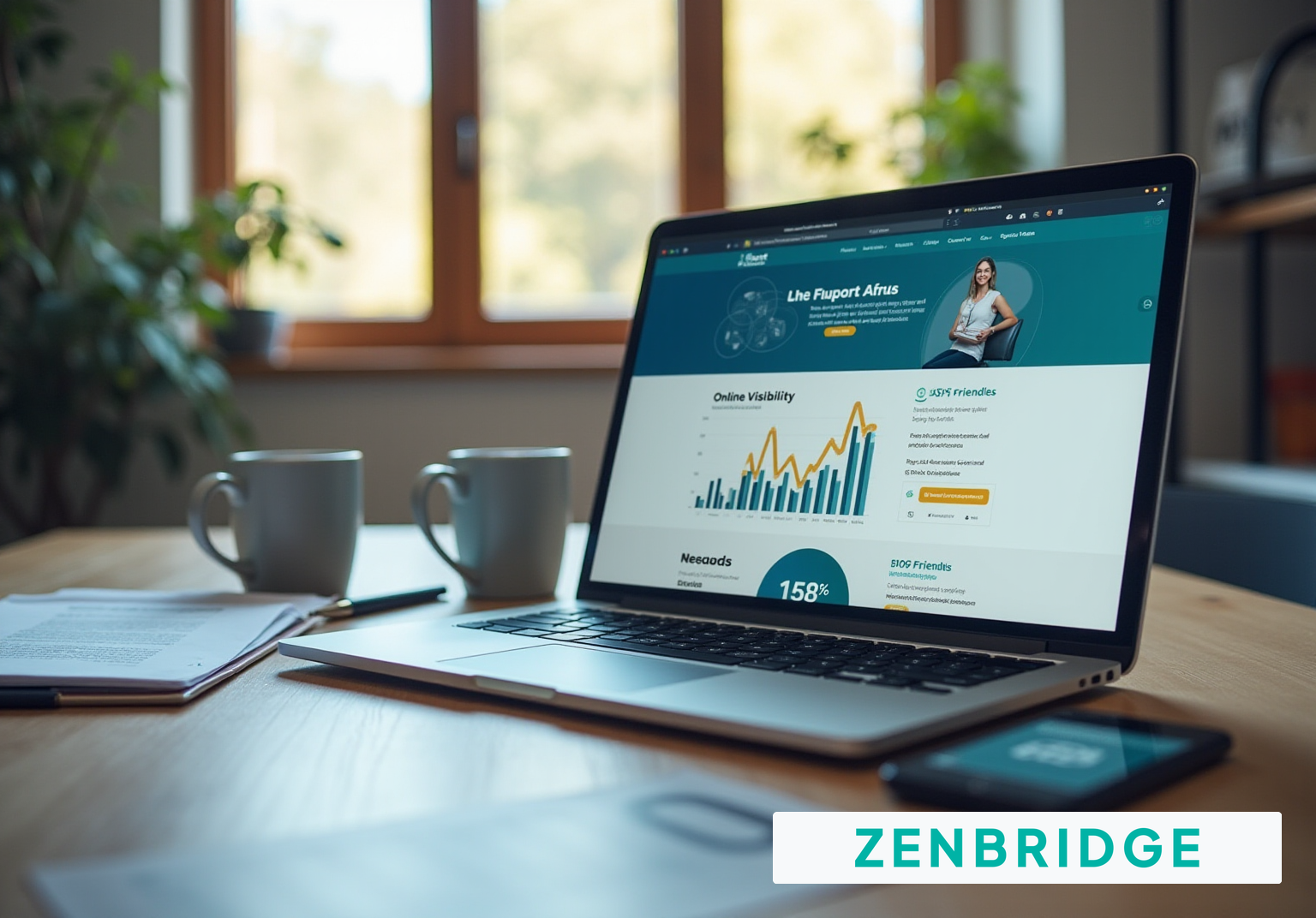
9 Essential Features for Effective Website Design Lawyer

Key Highlights:
- ZenBridge Consulting offers AI-driven automation solutions tailored for legal practise websites, enhancing online visibility and operations.
- The UpRank service boosts local SEO, making it easier for potential clients to find legal practises nearby.
- Local SEO is crucial, with 'near me' searches increasing over 900% in the past two years, emphasising the need for a strong online presence.
- Mobile-friendly design is essential, as many clients access sites via smartphones; responsive design improves user experience and SEO.
- Fast loading times are critical; 53% of mobile users leave sites that take longer than three seconds to load.
- Clear navigation enhances user experience, with 61% of users expecting to find information within five seconds.
- High-quality content, including well-researched articles and videos, establishes authority and attracts clients, with consistent blogging increasing indexed pages by 434%.
- Trust signals like testimonials and certifications build credibility; 87% of people read online reviews for local businesses.
- Professional branding is vital for establishing expertise and reliability, with 81% of buyers needing to trust a brand before purchasing.
- Security and compliance are crucial for protecting client information, with 29% of legal practises experiencing data breaches in 2023.
Introduction
In today’s digital world, where first impressions often happen online, effective website design for law firms is super important. More and more potential clients are turning to the internet to find legal services, and having the right website features can really make a difference in attracting and keeping clients.
So, let’s explore nine essential elements that not only improve user experience but also boost a law firm’s credibility and visibility in a competitive market.
How can legal practises make sure their online presence stands out and meets the ever-changing needs of their clients? Let’s dive in!
ZenBridge Consulting: Tailored Automation Solutions for Law Firm Websites
Hey there! ZenBridge Consulting truly excels as a website design lawyer by offering AI-driven automation solutions tailored for legal practise websites. By weaving in smart systems, ZenBridge helps legal practises amp up their online visibility, streamline operations, and connect better with customers.
Now, let’s talk about their UpRank service. It’s designed specifically to boost local SEO, making it super easy for potential customers to find law practises right in their neighbourhood. This smart strategy not only saves precious time but also ramps up marketing effectiveness, letting legal practises concentrate on what they do best—providing legal services—while ZenBridge takes care of the techy stuff.
Legal marketing specialists often say that having a strong online presence is crucial for attracting customers, and a website design lawyer like ZenBridge can provide pivotal solutions to achieve that goal. Did you know that 'near me' searches on Google have skyrocketed by over 900% in just the past two years? That really puts the spotlight on how vital local SEO is!
As Sasha Berson points out, investing in SEO and regularly updating strategies is key for legal practises, especially those that consult a website design lawyer to enhance their online visibility. Plus, with 97% of people learning more about a local business online than anywhere else, having a robust online presence is a must for legal practises eager to attract new clients. So, what do you think? Ready to dive into the world of local SEO with ZenBridge?
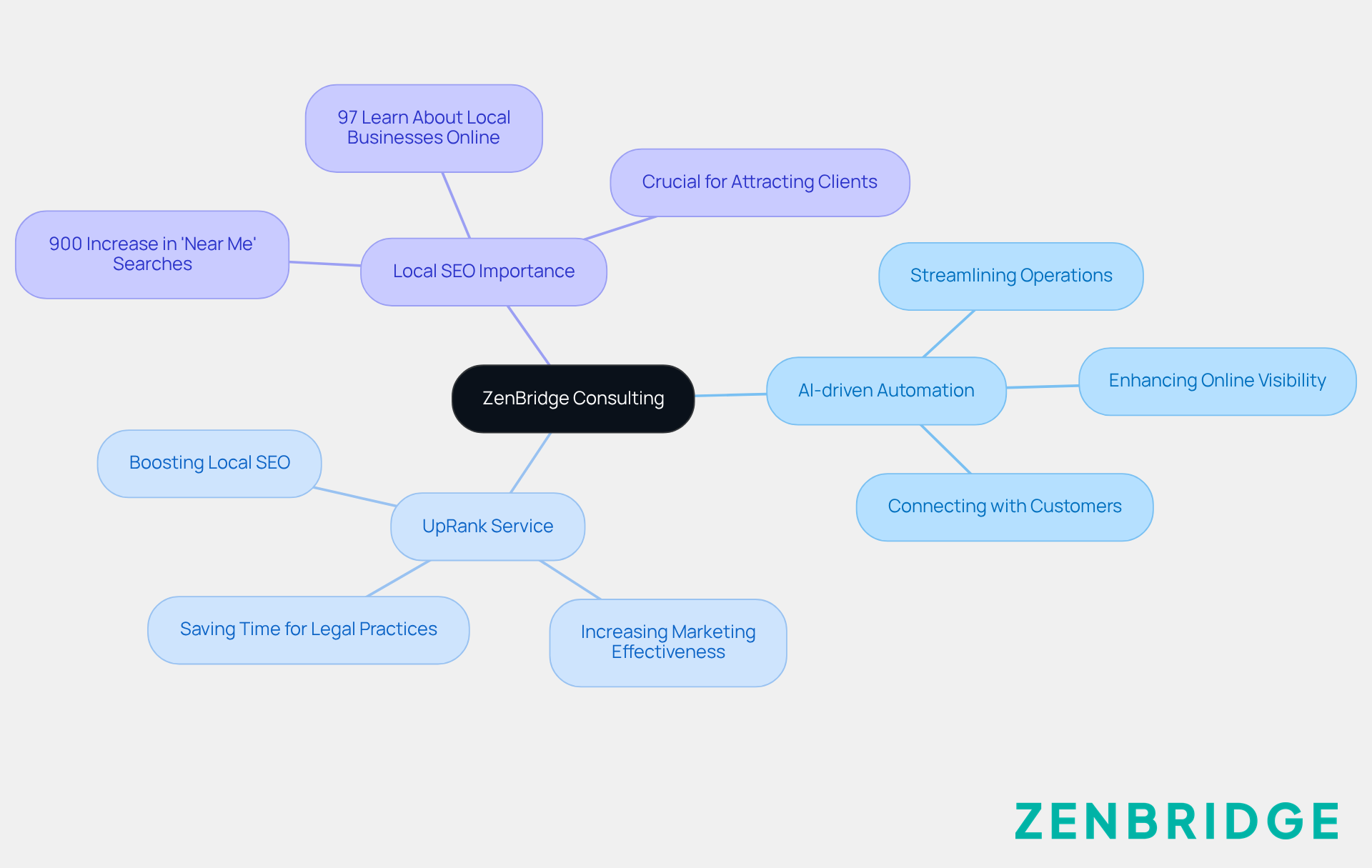
Mobile-Friendly Design: Ensuring Accessibility on All Devices
A mobile-friendly layout is super important for law practices, which is why consulting a website design lawyer is crucial, as many potential clients will be checking out your site on their smartphones or tablets. When your platform is responsive, it automatically adjusts to fit any screen size, giving users a smooth experience. This not only makes it easier for everyone to access your information but also helps boost your search engine rankings since Google loves mobile-friendly sites.
Therefore, a website design lawyer should help legal practices focus on crafting a clean, user-friendly design that works well on smaller screens. You want to make sure that users can easily find the info they need without any hassle. You know what I mean? Let’s make it easy for them!
Fast Loading Times: Enhancing User Experience and SEO
Hey there! Quick loading times are super important for online platforms managed by a website design lawyer. Even a tiny delay can really bump up those bounce rates and mean missed opportunities for potential clients. Did you know that 53% of mobile users leave websites that take longer than three seconds to load? For a website design lawyer, that’s a big deal for legal practises—speed really matters!
Now, here’s something to think about: the chance of bouncing increases by 32% when page load time goes from one second to three seconds. That just shows how critical loading times are. Plus, search engines like Google factor in loading speed for their rankings, which means a slow website design lawyer's site can harm their visibility in search results.
So, how can legal practises boost their loading times? Here are a few strategies:
- Optimise images by using modern formats like WebP or AVIF. These can shrink file sizes by up to 50% compared to JPEG or PNG!
- Leverage browser caching to keep frequently accessed data handy.
- Minimise heavy scripts that can drag down performance.
You might also want to consider using a Content Delivery Network (CDN). This can seriously amp up your page speed globally by spreading content across servers worldwide. And hey, make it a habit to run site speed tests regularly—at least once a quarter or after major updates. Tools like Google PageSpeed Insights can pinpoint areas for improvement, keeping your platform competitive and user-friendly. Let’s keep the conversation going—what are your thoughts on these strategies?
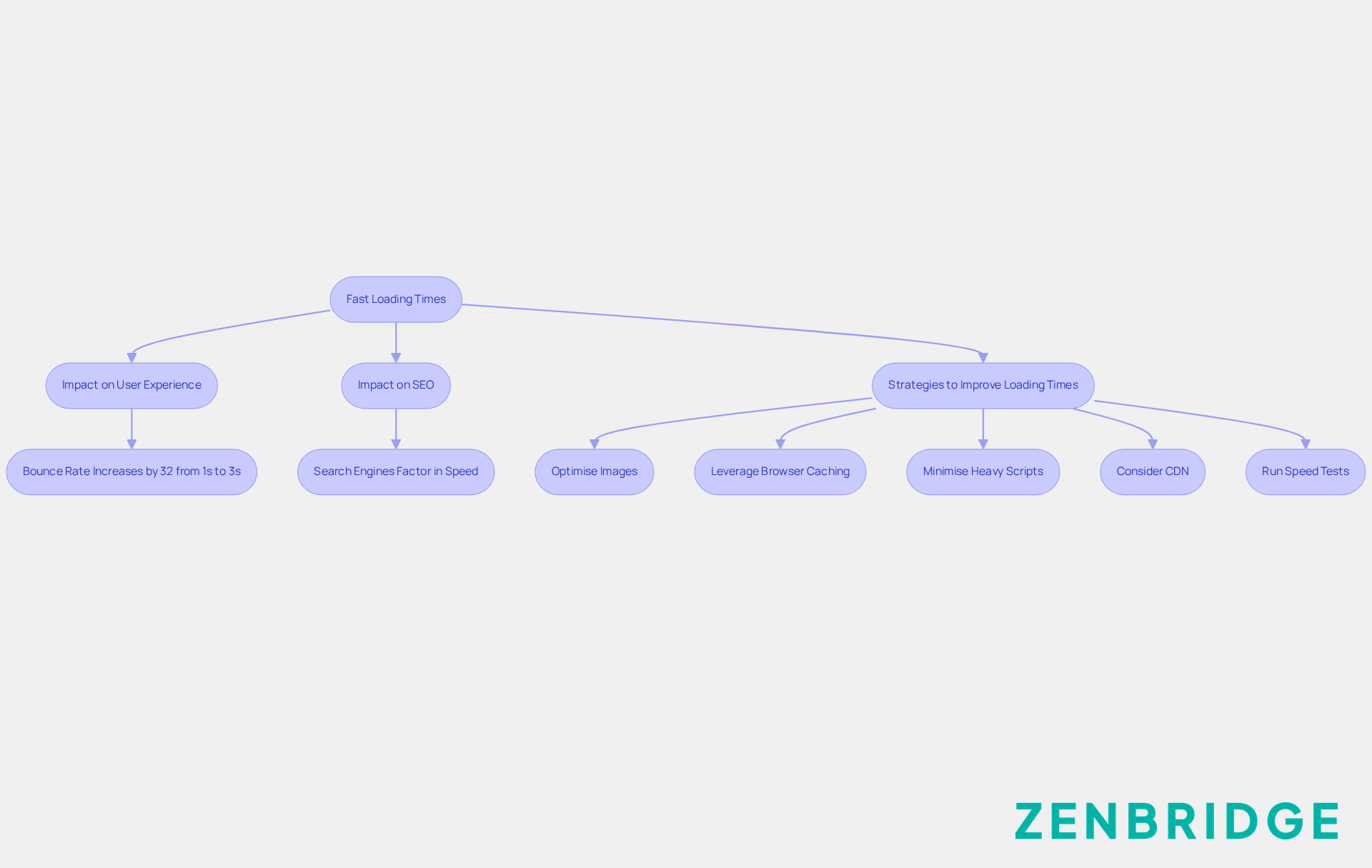
Clear Navigation: Facilitating User Experience and Information Access
Hey there! Clear navigation is super important for effective website design lawyer practises. It really impacts how users experience the site and how easily they can find information. A well-structured navigation menu helps users locate what they need quickly, which cuts down on frustration and boosts satisfaction.
A website design lawyer should ensure that legal practises aim for a simple, intuitive layout that categorises services logically. Each section needs to be clearly labelled, so users know exactly where to go. For example, using breadcrumb navigation can really help users stay oriented. It allows visitors to backtrack easily and explore related content without getting lost.
Did you know that 61% of users expect to find what they need within just five seconds? That’s a wake-up call for legal practises to step up their navigation game! Plus, pages that use breadcrumb navigation can increase engagement by up to 30%. That’s pretty impressive, right?
Regularly reviewing and updating your navigation based on user feedback can lead to a 20% increase in user retention. It just shows how valuable continuous improvement in usability is! As David Jenkin puts it, a seamless UX has the potential to boost your conversion rate by up to 200%, which is a point often highlighted by a website design lawyer. That really highlights the financial perks of effective navigation.
And with mobile traffic making up more than 54% of global online traffic, making sure your site is mobile-friendly is a must for legal practises. By focusing on these elements, legal platforms can enhance user interaction, build trust, and ultimately attract and retain customers. So, what do you think? Ready to dive into improving your website's navigation?
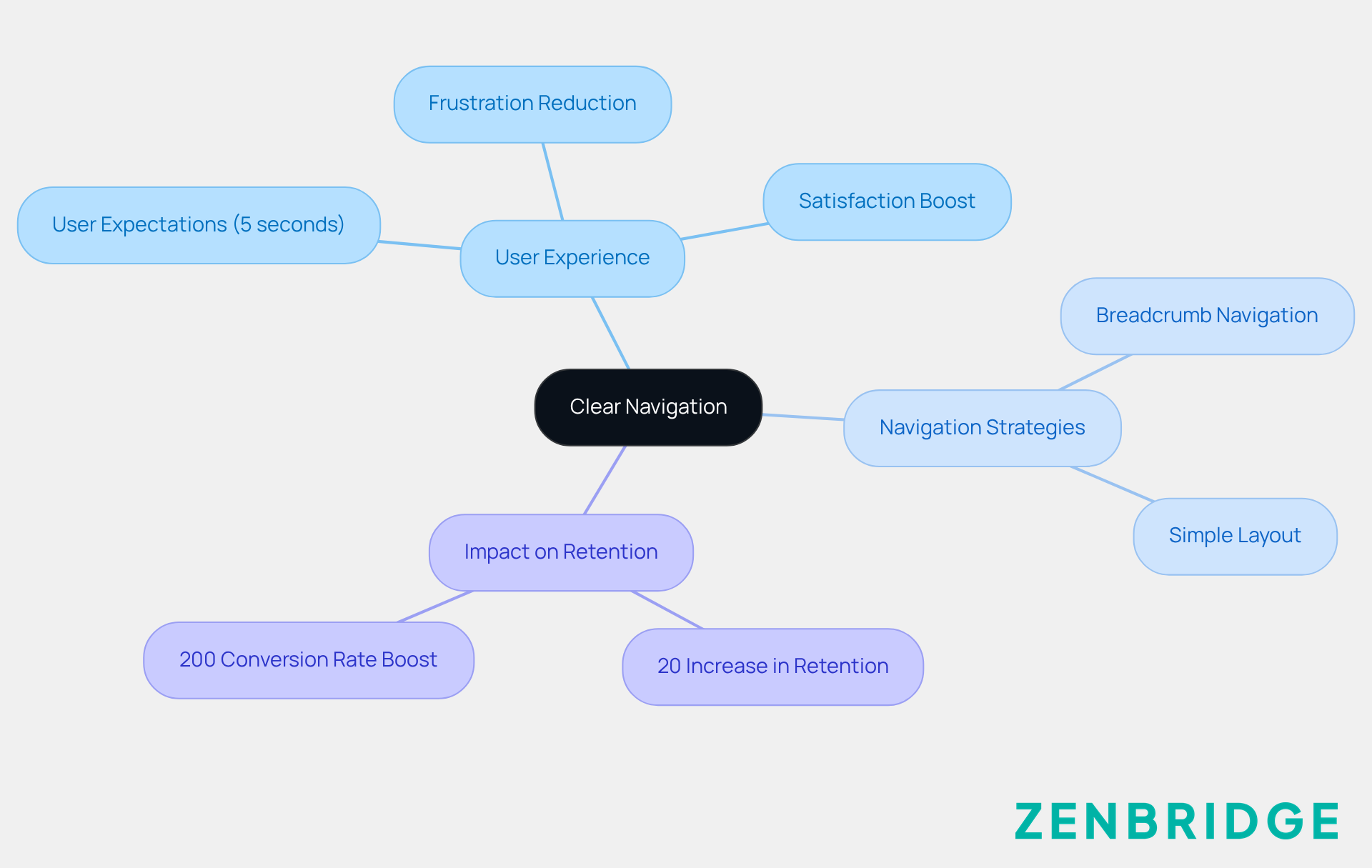
High-Quality Content: Engaging Visitors and Establishing Authority
Hey there! High-quality content is super important for a website design lawyer's law office websites. It’s not just about attracting visitors; it’s also a great way to establish authority in specific practice areas. Legal practices should really focus on creating informative, well-researched articles, blog posts, and FAQs that answer common questions related to the expertise of a website design lawyer. This not only demonstrates their expertise but also assists potential clients in locating their website design lawyer online.
Now, let’s talk about keywords. Incorporating relevant keywords naturally into the content boosts search engine optimization (SEO) and increases the chances of potential customers discovering the business. Keeping content fresh and sharing insights on legal trends can also help solidify the organization’s status as a thought leader in the industry.
Here’s the deal: legal practices that dive into content marketing often see substantial growth in website traffic and customer trust. In fact, those that blog consistently have 434% more indexed pages! Plus, practices that keep their content updated attract 400% more traffic than those that don’t.
And let’s not forget about video content! Did you know that viewers retain 95% of a message when it’s presented in video format, compared to just 10% in text? By using these strategies, including optimizing for local searches, legal practices can effectively establish their authority and draw in a steady stream of customers. So, what do you think? Ready to take your content to the next level?
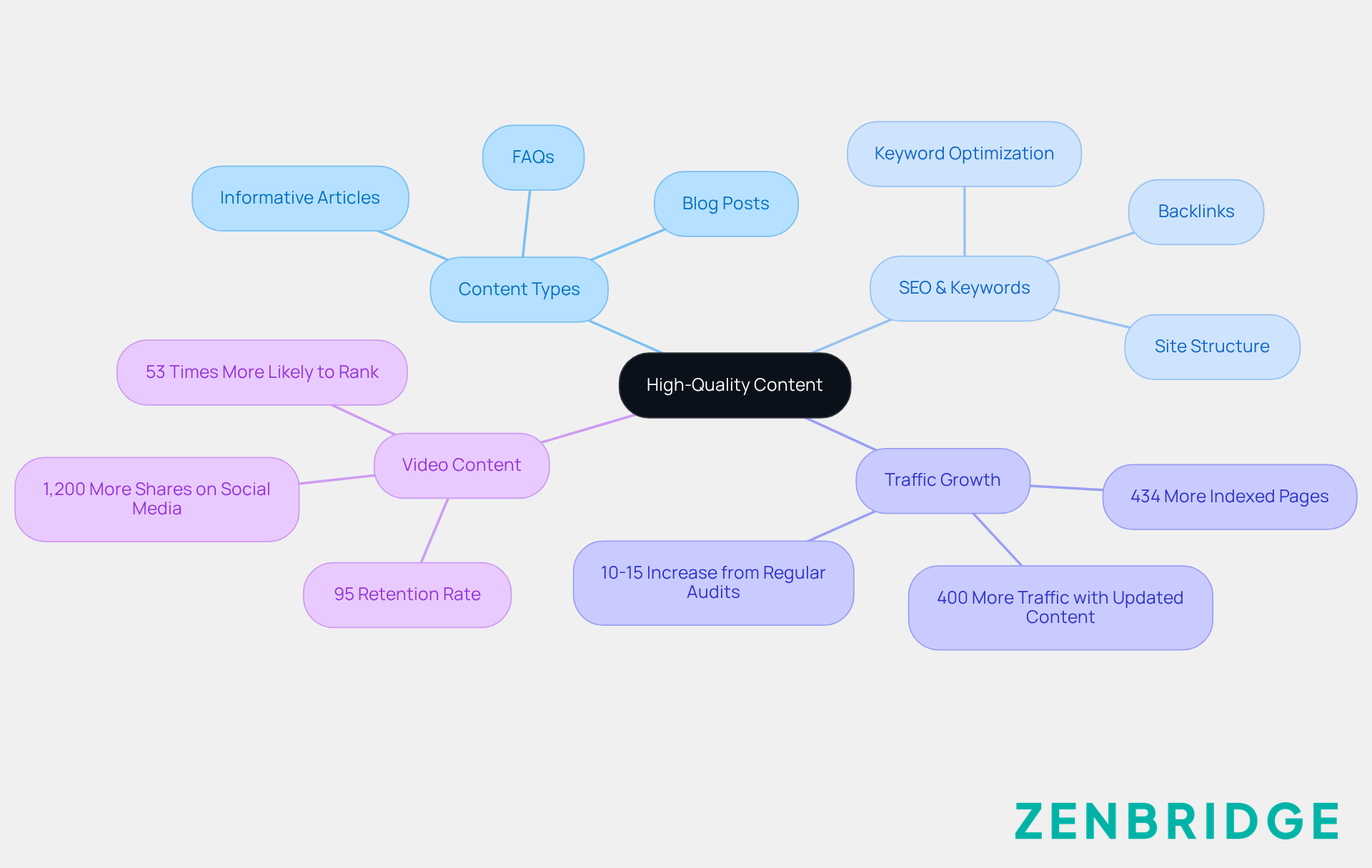
Trust Signals: Building Credibility with Potential Clients
Hey there! Trust indicators are super important for legal practises that want to build credibility and attract potential clients. You know, things like customer testimonials, case studies, professional certifications, and ties with respected legal organisations really serve as strong endorsements of a firm's reliability and expertise. When these elements are prominently displayed on a law practise's website, they can really put potential customers at ease, showcasing the expertise of a website design lawyer.
For example, did you know that 87% of people read online reviews for local businesses? They trust those reviews just as much as personal recommendations! This really highlights how essential it is to showcase positive feedback. Plus, adding trust badges, like SSL certificates for secure transactions, can further boost customer confidence in the organisation’s commitment to security and professionalism.
Now, let’s talk about why legal practises should actively seek out and highlight positive feedback. Fresh testimonials are key; in fact, 85% of consumers tend to overlook reviews that are older than three months! Engaging with customers for their feedback not only strengthens relationships but also provides valuable insights into service quality. Successful companies often use customer testimonials and case studies to demonstrate their effectiveness, showing how they’ve positively impacted the lives of those they serve.
By taking a proactive approach to reputation management, legal practises can work with a website design lawyer to create a strong online presence that builds trust and encourages potential clients to reach out for their services.
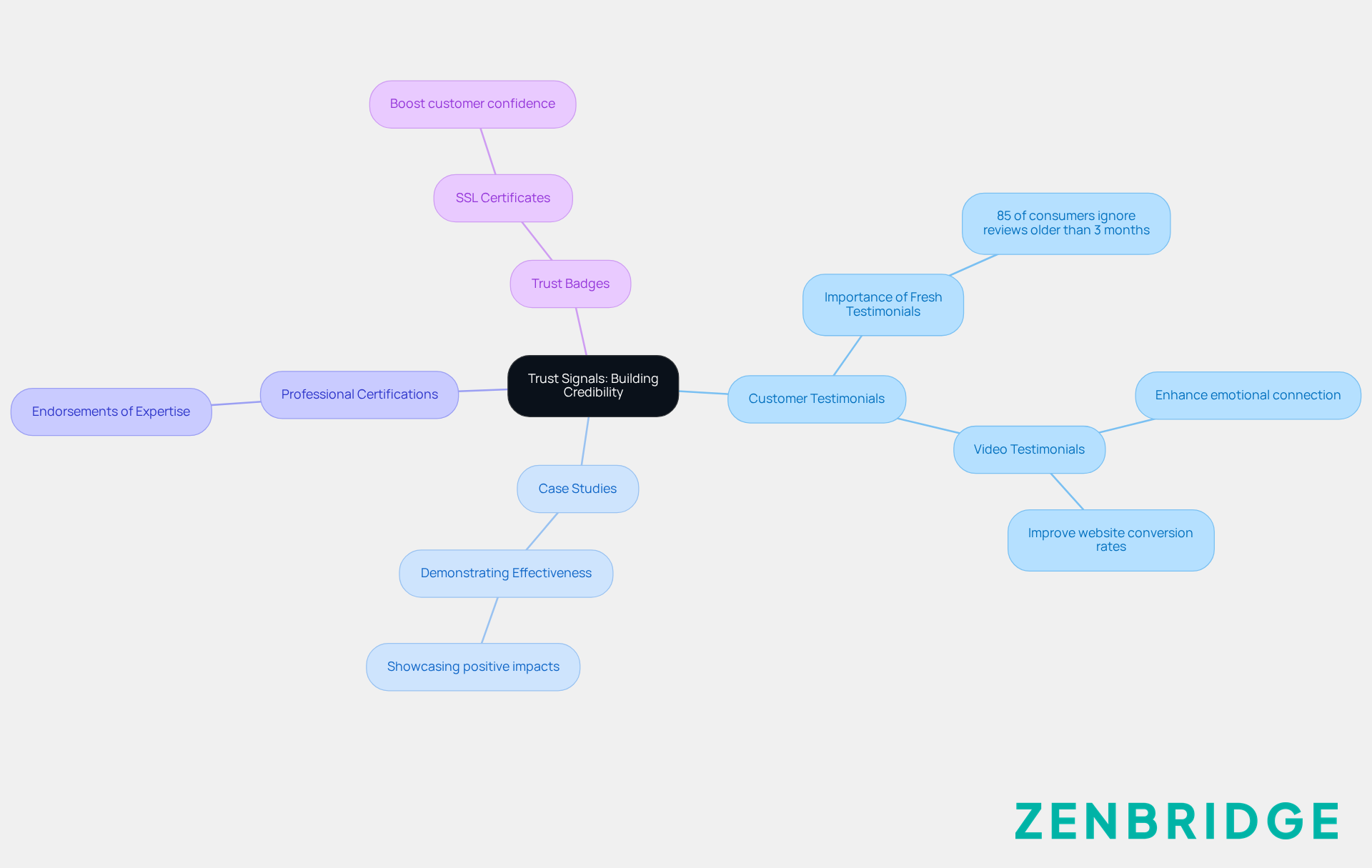
Professional Branding: Conveying Expertise and Reliability
Hey there! Let’s talk about why professional branding is super important for legal practises. It’s all about showing off your expertise and building trust with potential clients. A cohesive brand identity—think a snazzy logo, consistent colours, and professional fonts—can really shape how people see you.
Did you know that 81% of buyers need to feel confident in a brand before they make a purchase? That’s why it’s key for legal practises to establish a solid brand presence everywhere—on their websites, social media, and promotional materials. This kind of consistency not only sets you apart from the competition but also builds trust and credibility with your clients.
As branding experts say, "Trust is crucial for consumer purchasing decisions, with 81% of consumers needing to trust a brand to consider buying from it." A clear brand identity can really boost customer loyalty and engagement. When legal practises share their brand values and keep a consistent image, they come across as dependable and trustworthy, which can lead to better customer retention and more referrals.
Plus, 68% of businesses recognise that brand consistency can lead to revenue growth of 10% or more. That’s some serious incentive to focus on cohesive branding! In today’s competitive market, branding isn’t just about looking good; it’s a strategic must-have that shapes how customers perceive you and drives your business success. So, what do you think? Ready to dive into your branding strategy?
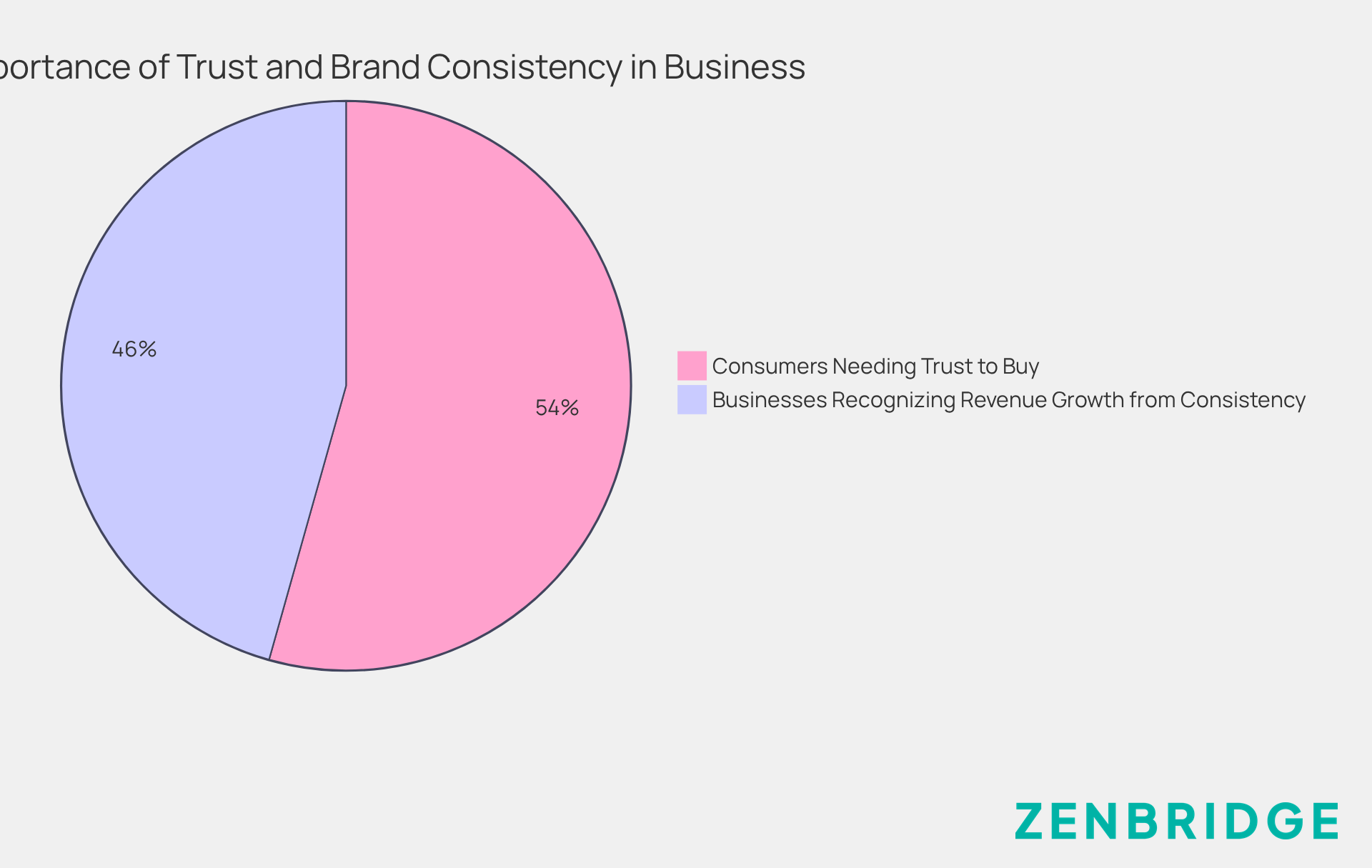
Security and Compliance: Protecting Client Information
Hey there! Let’s chat about something super important for legal practises: security and compliance. Given how sensitive customer info can be, it’s crucial to get this right. Did you know that around 29% of legal practises faced a data breach in 2023? That really highlights the need for solid security measures.
So, what can you do? Implementing SSL encryption, setting up secure user portals, and conducting regular security audits are essential steps to keep those pesky data breaches at bay. Plus, the average cost of a data breach across all industries hit $4.45 million in 2023! That’s a big deal and shows just how vital it is to prioritise security.
Now, let’s talk regulations. Depending on your jurisdiction and expertise, you’ll need to follow rules like GDPR or HIPAA. And don’t forget about your team! Regular training on data protection best practises is key, especially since human error is responsible for 95% of successful cyberattacks. Ongoing education for your staff is a must.
Experts like Gavin Miller stress that legal practises have an ethical duty to protect customer information. It’s all about building and maintaining that consumer trust. Regular audits and updates to your security protocols are vital for compliance and to reduce risks associated with data breaches.
By taking a proactive approach to security, you can effectively safeguard confidential information and keep up your ethical responsibilities. So, what do you think? Ready to dive into enhancing your security measures?
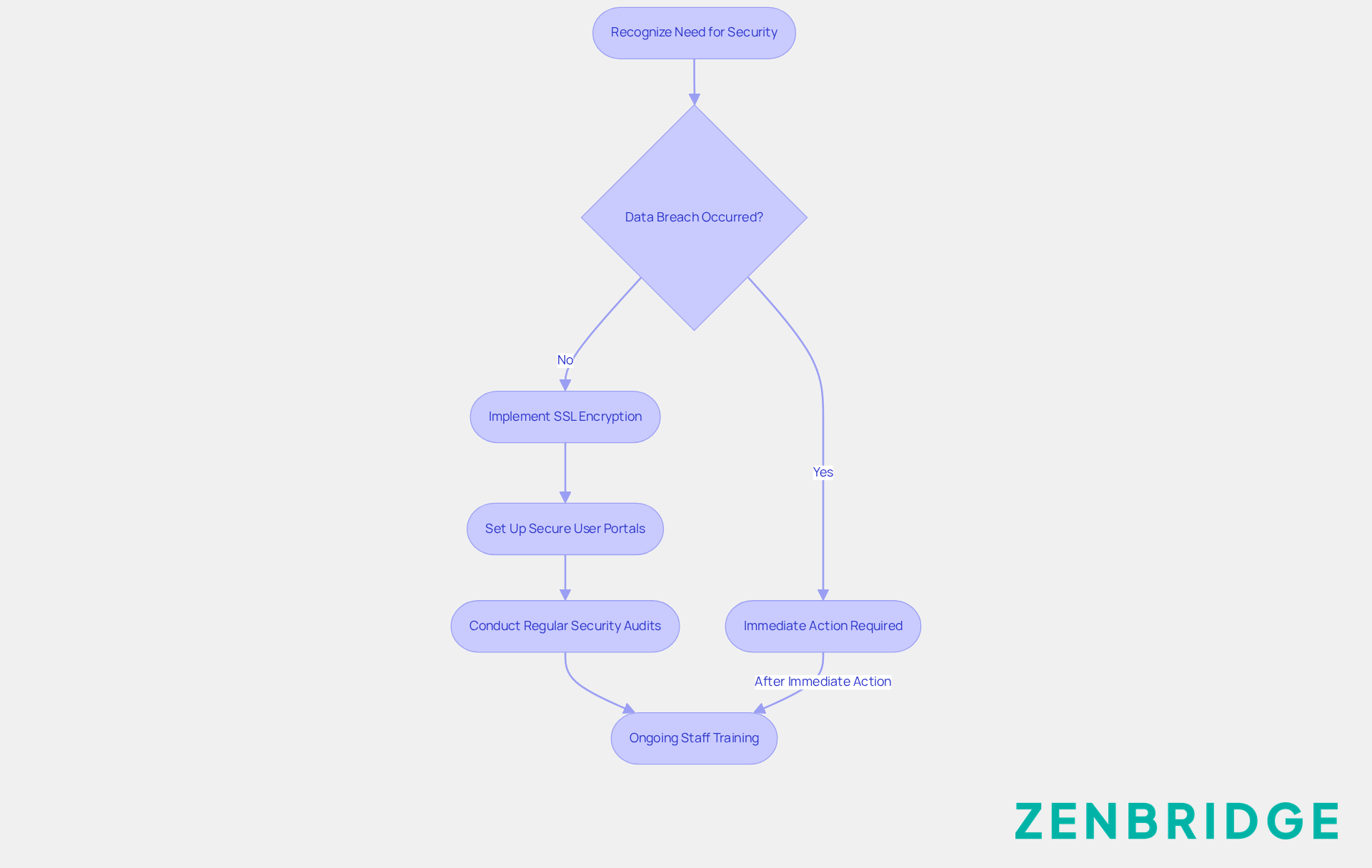
User-Centric Design: Meeting Client Needs and Expectations
User-focused design is super important for legal practise platforms. It really highlights what customers need and expect. By understanding how users behave and what they prefer, you can make design choices that ensure the platform is easy to use and navigate.
Legal practises should definitely conduct user testing and gather feedback to identify any bumps in the road and areas that could use some improvement. Focusing on the customer experience means legal practises can create a website that not only attracts visitors but also turns them into loyal customers.
So, what do you think? Ready to dive deeper into this?
SEO Optimization: Increasing Online Visibility and Attracting Clients
Hey there! SEO enhancement is super important for legal practices looking to boost their online presence and attract new clients. By implementing effective SEO strategies—like keyword research, on-page optimization, and local SEO tactics—you can really improve your search rankings.
Now, let’s talk about creating high-quality, relevant content that meets your customers' needs and includes those targeted keywords. It’s all about connecting with your audience! Plus, don’t forget to optimise your meta tags, headers, and images to give your website's search engine performance a nice little boost.
And here’s the deal: regularly monitoring your analytics and tweaking your strategies based on performance data can further enhance your visibility and help you bring in more clients. So, what do you think? Ready to dive into the world of SEO?
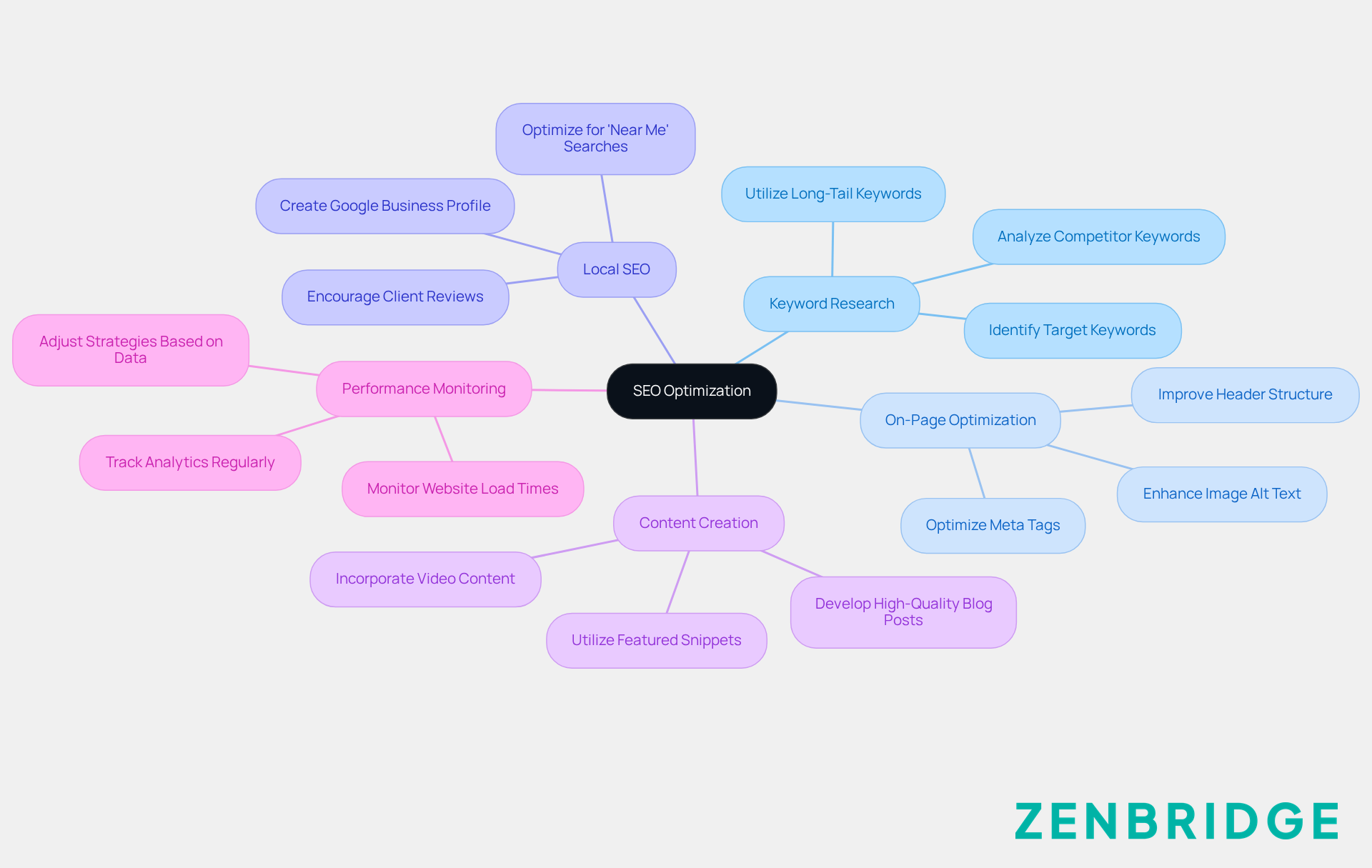
Conclusion
Effective website design is super important for law practises looking to boost their online presence and attract new clients. By focusing on key features like:
- Mobile-friendly design
- Fast loading times
- Clear navigation
- High-quality content
- Trust signals
legal practitioners can create a user-friendly experience that meets client needs and builds credibility in a competitive market.
Throughout this article, we’ve highlighted the importance of each feature. From ZenBridge Consulting's tailored automation solutions that enhance SEO and visibility, to the need for security and compliance in safeguarding sensitive client information, every element is crucial for a law firm's website effectiveness. Plus, emphasising professional branding and user experience shows how these aspects directly influence client trust and engagement.
So, here’s the deal: prioritising effective website design isn’t just a nice-to-have; it’s a strategic necessity for legal practises. By honing in on these essential features, law firms can really amp up their online visibility, build stronger client relationships, and ultimately drive business growth. Embracing these strategies will not only improve user experience but also position legal practises as reliable and authoritative in their field. Let’s keep the conversation going—what are your thoughts on enhancing your website?
Frequently Asked Questions
What services does ZenBridge Consulting offer for law firm websites?
ZenBridge Consulting provides AI-driven automation solutions tailored for legal practise websites, helping to enhance online visibility, streamline operations, and improve customer connexions.
What is the UpRank service by ZenBridge Consulting?
The UpRank service is designed to boost local SEO, making it easier for potential customers to find law practises in their neighbourhood, thereby improving marketing effectiveness and allowing legal practises to focus on their core services.
Why is local SEO important for law practises?
Local SEO is crucial because 'near me' searches on Google have increased significantly, with over 900% growth in the past two years. A strong online presence is essential for attracting new clients, as 97% of people learn about local businesses online.
How does mobile-friendly design benefit law practises?
A mobile-friendly design ensures that websites are accessible on smartphones and tablets, providing a smooth user experience. It also helps improve search engine rankings, as Google favours mobile-friendly sites.
What are the key factors for ensuring fast loading times for law firm websites?
Fast loading times are critical for user experience and SEO. Strategies to enhance loading times include optimising images, leveraging browser caching, minimising heavy scripts, and using a Content Delivery Network (CDN).
What impact do loading times have on user behaviour?
Loading times significantly affect user behaviour; 53% of mobile users leave websites that take longer than three seconds to load. Additionally, the chance of bouncing increases by 32% when page load time increases from one second to three seconds.
What tools can legal practises use to monitor and improve their website's loading speed?
Legal practises can use tools like Google PageSpeed Insights to run site speed tests regularly, identifying areas for improvement to keep their website competitive and user-friendly.
